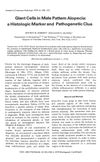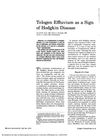Alopecia: A Pathologist's View
July 1982
in “
International Journal of Dermatology
”
alopecia hair growth cycle anagen catagen telogen follicle destruction telogen induction anagen hair breakage biopsy techniques congenital alopecia scarring alopecia non-scarring alopecia histologic findings alopecia areata autoimmune diseases T-cell function anagen defluvium seborrhoeic warts benign skin lesions hair loss hair growth phases hair follicle damage hair biopsy scarring hair loss non-scarring hair loss immune system diseases T-cells seborrhoeic keratosis skin growths

TLDR The review concludes that accurate diagnosis of different types of hair loss requires proper biopsy techniques and understanding the hair growth cycle and underlying causes.
In the 1982 review, the author George Joannides provides an in-depth analysis of alopecia from a pathologist's perspective, detailing the hair growth cycle, causes of hair loss, and diagnostic methods. The review explains that hair follicles undergo anagen, catagen, and telogen phases, and alopecia can result from various mechanisms such as follicle destruction, increased telogen induction, and anagen hair breakage. It emphasizes the importance of proper biopsy techniques, including the use of larger specimens and correct orientation during embedding, to accurately diagnose different forms of alopecia. The paper categorizes alopecia into congenital, scarring, and non-scarring types, and describes histologic findings for each. It also discusses alopecia areata, noting its association with autoimmune diseases and defective T-cell function, and anagen defluvium, which involves the loss of defective anagen hairs. Additionally, the document touches on seborrhoeic warts, benign skin lesions unrelated to seborrhoea, common in individuals over 40, and provides guidance on their treatment.












